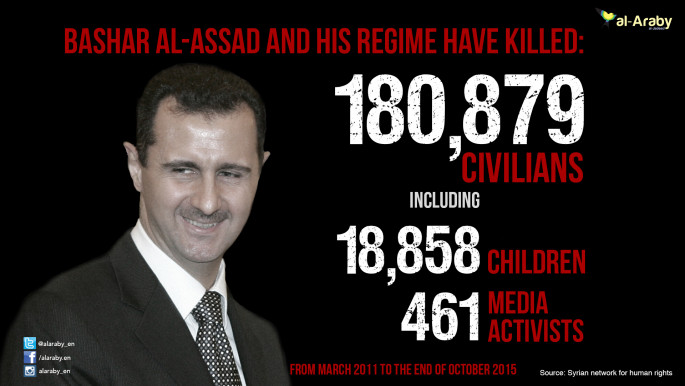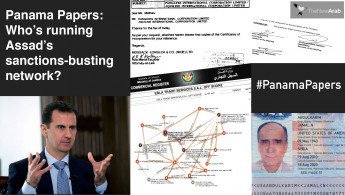All the dictator's men: Who runs Assad's sanctions-busting network?
The US Treasury, over three rounds of sanctions, was able to expand its net and catch more people, companies and ships used by the Syrian regime and its associates to procure fuel, gas, and sanctioned equipment and technology - including weaponry and ammunition - for Damascus.
However, the Panama Papers released this week uncover several other key figures and shell companies that are part of this network - and that were able to remain undetected by registering themselves offshores, mostly in tax havens.
The most prominent person the US government seems to have initially missed is the founder of the US- and EU-designated Abdulkarim Group, Jamal Abdulkarim, a Palestinian-Syrian who also holds a US passport and a passport from Saint Kitts, the Caribbean island nation that grants passports to offshore company owners.
Although the Abdulkarim Group has been on the international sanctions lists, it was Wael Abdulkarim, Jamal's son, rather than Jamal himself, who has been mainly designated on sanctions lists in the past, along with other relatives and associates.
| Read Also: Exclusive: The Assad family ties to Israeli business tycoon |
Jamal Abdulkarim currently lives in Damascus, according to the leaks seen by The New Arab. In addition to being the main shareholder in the Abdulkarim Group, he is also a leading shareholder in the US-designated Morgan Middle East Ltd, which is on the sanctions list.
However, his name did not appear in the sanctions, mainly because he is not listed in the company's records in the Seychelles, a known offshore haven.
The activities he is involved in both within Syria and beyond are extensive, and range from import of motor oil and lubricants, to engines and industrial equipment and machinery from the US, Italy and Germany - among others.
The US Treasury did not respond to a request for comment, but the Office of Foreign Assets Control (OFAC) said it was working tirelessly to punish violators of the sanctions regime, be they individuals or companies.
 |
Thanks to the Panama leaks, we can learn more about how the Assad regime's shadow brokers work and who they are |  |
Fathers and sons
The Abdulkarim Group is at the centre of international networks responsible for providing energy products used by the Assad regime, but by no means is it the only component in the murky web of finance that continues to fuel the ongoing conflict in Syria, according to OFAC.
While the US Treasury has revealed a lot of details about the shell and offshore companies that make up the networks in the past several years, it has missed several important facts.
But thanks to the Panama leaks, we can learn more about how the Assad regime's shadow brokers work and who they are.
| The shady web of alleged sanctions-busters and dodgy characters unearthed by the Panama Papers |
| - Mohammed Hashem al-Soufi, Syrian-Lebanese businessman. Shareholder in Elba Trade Services S.A. Founded an anti-corruption NGO. - Mohammed Fadi Abdulkarim. Shareholder in Morgan Middle East. - Adnan Ibrahim Abdulkarim. Shareholder in Pangates, under US sanctions. - Nassim Barqawi. Palestinian Syrian. Shareholder in Pangates. - Abdullah Zaina. Syrian businessman. Shareholder and manager in Pangates. - Suleiman Khamis Rashid Al Ali. Emirati businessman. Manager at US-designated Morgan. - Yasser Barazi. Palestinian. Current manager at Morgan. |
For instance, US authorities could not discover the identities of the real owners of Ebla Trade Services S.A., a Lebanon-based offshore company designated in the sanctions for its involvement in supplying gas to the Syrian regime's war effort.
Despite Lebanese legal restrictions on information access regarding offshore companies to the public, The New Arab was able to obtain the company's commercial registration details, including the names of 13 Lebanese and Syrian shareholders and authorised signatories.
The Assad nexus
Intriguingly, it appears that sons of business tycoons under sanction because of their close links with the Syrian regime are involved, mirroring the case of Wael and Jamal Abdulkarim.
Thus Ahmad Saber and Amro, sons of Mohammed Hamsho of Hamsho International Group, who is himself under sanctions, appear in the Lebanese offshore company's records.
Hamsho Senior is part of Assad's inner sanctum and is a business partner of the infamous Rami Makhlouf, the economic powerhouse of the Syrian regime.
European - in addition to US - sanctions were imposed on Hamsho in mid-2011 for his links to Bashar and Maher al-Assad, but were removed by a European appellate court in November 2014. However, sanctions were imposed again by the EU after Britain provided fresh evidence.
Hamsho's empire includes communications, technology, tourism and real estate companies.
Hamsho and his sons are another way the Assad regime and the Abdulkarim group are linked. The firm Ebla, on whose board sits Hamsho's sons, has done business with Milenyum Energy S.A., a company registered in Panama and operating in Turkey - and closely linked to the Abdulkarim group.
Milenyum was included in the US sanctions regime for "having materially assisted, sponsored, or provided financial, material, or technological support for, or goods or services in support of, the government of Syria", especially through fuel shipments.
 |
The use of offshore consultancies like Mossack Fonseca to hide its tracks has only recently started coming to light |  |
Offshore tentacles
That the Syrian regime has been using front companies and shady businessmen to dodge international restrictions is not new. However, the use of offshore consultancies like Mossack Fonseca to hide its tracks has only recently started coming to light.
 |
|
| [Click to enlarge] |
Operating through offshore entities is not illegal or automatically a sign of wrongdoing.
However, it does allow criminals to hide the money trail from their various crimes, and dictatorial and rogue regimes to dodge international sanctions, thanks to strict banking secrecy laws protecting the accounts of foreign clients in faraway offshore havens.
The US authorities were able to link the Abdulkarim group to shell companies such as The Eagles LLC, in addition to the aforementioned Morgan Additives Manufacturing (Jebel Ali-based and registered in Seychelles) as well as Milenyum.
The Panama Papers, consisting of 11 million documents leaked from one of the world's most secretive companies, Panamanian law firm Mossack Fonseca, were able to shed further details on the networks used by the Assad regime.
Yasser Barazi, current director of the Morgan firm, denied to The New Arab any wrongdoing, insisting the company was neither owned nor directed by Wael Abdulkarim. Barazi claimed the company was founded in Seychelles in April 2012, but documents obtained by The New Arab suggest the company has been run by Wael Abdulkarim since 2011, when Syria's political unrest broke out into deadly violence.
 |
|
| [Click to enlarge] |
Barazi further claimed the company had no commercial activities prior to the sanctions, a period during which it was "still being established".
However, he did not explain how the company had a branch a Dubai for five years without engaging in any business.
He said Abdulkarim resigned and sold his shares in the company, as did other shareholders designated in sanctions listings by the US, insisting that the Emirati authorities ban his company from conducting any business with the Syrian government.
The company is currently appealing the designation, Barazi added, but failed to establish whether pointman Jamal Abdulkarim had also withdrawn from the company.
Mossack Fonseca has also insisted to The New Arab that it has no involvement in illegal activities by companies it has registered offshore, saying they do not intervene beyond registering them.
However, the Panama documents show Mossack Fonseca appeared to have continued its dealings with the Abdulkarim group, despite it being sanctioned by the US.
It has also been revealed in a separate investigation that Mossack Fonesca dealt with Rami Makhlouf, Bashar al-Assad's cousin who is also designated by the US under sanctions legislation.
For a full list of US sanctions, detailed information is available on companies, individuals and banks designated by the US Dept of the Treasury here.
Original Arabic investigation by Nizar al-Ghazali.
Additional translation and writing by Karim Traboulsi.



